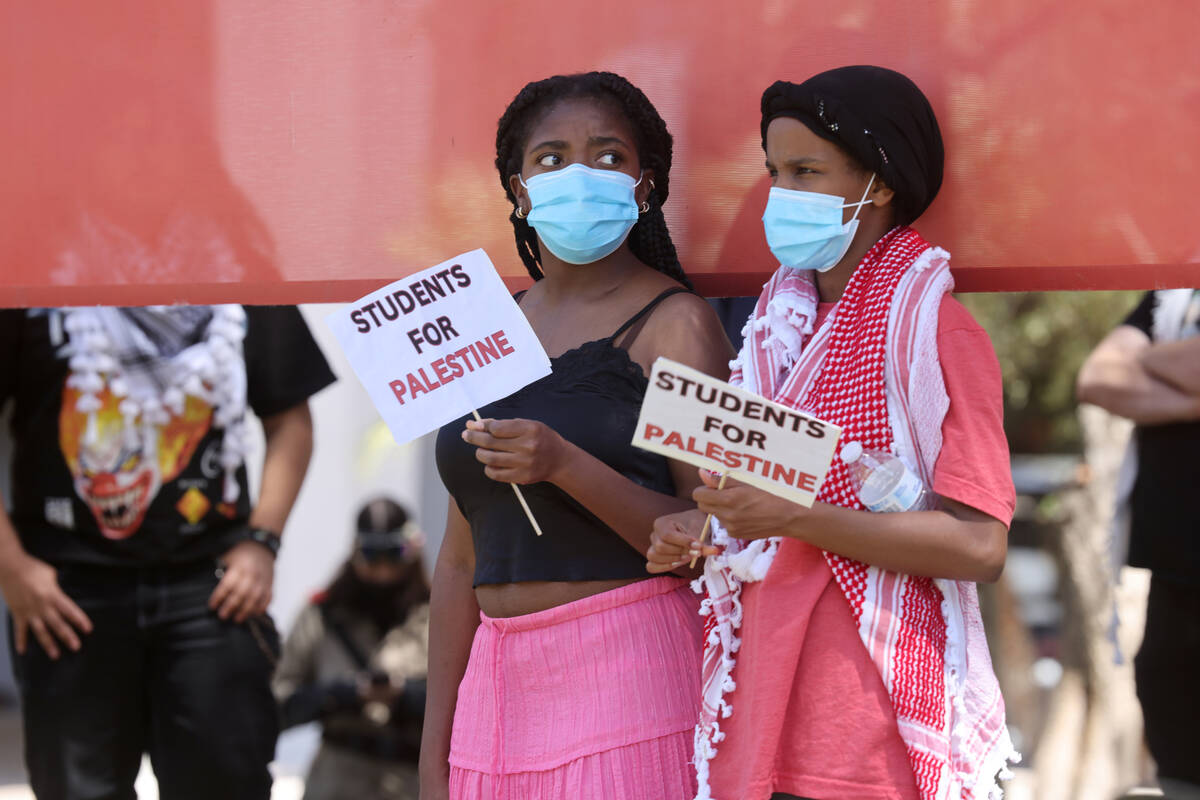UNLV officials, pro-Palestinian protesters meet. What was said is in dispute.

Pro-Palestinian protesters and UNLV are at odds over reported meetings they’ve held regarding the university’s potential investments tied to Israel.
A UNLV organization that is part of a coalition of groups that have protested on the university’s amphitheater over the past couple of weeks claims to have met with the university’s administration and says “progress was made to meet stated demands of disclosure, divestment, and defense” of pro-Palestinian, Muslim and Arab students who allegedly face harassment.
Students for Justice in Palestine claim students who are part of the movement went on a dayslong hunger strike that ended “due to the administration’s willingness to meet demands shown in the meeting,” the group said in an email. The group declined to provide any names of students to talk to because of an alleged hostile environment that pro-Palestinian activists face and did not return follow-up emails from the Las Vegas Review-Journal asking for more information on the hunger strike.
The university, however, said President Keith Whitfield and administrators continue to meet with student leaders and faculty representing all sides of the Israel-Hamas war in Gaza, but that UNLV did not make a commitment to divest and disclose potential investments tied to Israel. A university spokesman was unable to provide more information about what was discussed at the meetings.
‘Shock’
Lilach Levaton, activism manager at the Israeli-American Council, said she was in “shock” to hear Whitfield met with the protesters.
“They’re trying to bully the university,” Levaton said of the protesters.
Levaton said she and other members of the IAC have seen an increase in what she says are antisemitic incidents on UNLV’s campus since the Oct. 7 terrorist attack by Hamas on Israel that killed about 1,200 people and took around 250 hostages.
The Israeli-American Council wants the university to meet with the organization and work together to ensure the safety of Jewish students. It doesn’t want the university to support Students for Justice in Palestine in any way, and it wants the university to accept the definition of antisemitism under the International Holocaust Remembrance Alliance, which would expand the definition, Levaton said.
Students for Justice in Palestine said in an email that some Jewish students are part of the same movement — what they say is the need for justice for Palestinians — at UNLV and around the country.
“Jewish students at UNLV, as well as across the country, are in the front lines advocating for these demands,” the email said.
In its statement, UNLV said it condemns bigotry against both Jews and Muslims.
Nevada law at play?
The Israeli-American Council started a campaign urging people to email Whitfield and members of the Board of Regents to oppose protesters’ demands for Boycott, Divestment and Sanctions — or BDS— a Palestinian-led movement to reduce international support for Israel and politically isolate the Jewish state.
The IAC says the student group’s demand of the university would run contrary to a Nevada law signed by then-Republican Gov. Brian Sandoval in 2017 that prohibits government entities from contracting with or investing in companies that boycott Israel. UNLV is a public university and should not support any act of BDS, Levaton said.
The Nevada law, however, would not have a direct impact at the university level because it primarily concerns provisions related to state purchasing contracts, according to the governor’s office.
‘Should be places of dialogue and debate’
Demonstrations on UNLV’s campus are part of nationwide campus protests over Israel’s response to the Oct. 7 Hamas attack. In response to that invasion, Israel vowed to destroy Hamas. Israeli strikes have killed more than 34,000 people in Gaza, according to the Hamas-run Health Ministry. The ministry doesn’t distinguish civilian deaths from the deaths of terrorist combatants.
Chris Wang, a Las Vegas educator and community organizer who has been a strong pro-Palestine advocate, said many Nevadans have major concerns about the U.S. funding the Israeli war in Gaza. Community advocates have called for an immediate and permanent cease-fire in Gaza and the return of displaced people to their homes.
In contrast to some of the larger protests that have roiled university campuses across the country and resulted in many arrests, UNLV’s protests so far have been peaceful, with both sides at most exchanging heated words.
That said, some Jewish students at UNLV said during a rally against antisemitism on Monday that they feel the university hasn’t done enough to stem antisemitic behavior and rhetoric from some on campus, including from some of the pro-Palestinian protesters, in the months since Oct. 7.
Jolie Brislin, the regional director of the Anti-Defamation League’s Desert Region, which includes Nevada and Arizona, said language surrounding genocide, apartheid and occupation that portrays one group as entirely evil is antisemitic. They invoke fear and intimidation, and while constructive criticism of Israel is not antisemitic, “delegitimizing, demonizing, and holding Israel to double standards are antisemitic,” Brislin said.
“College campuses should be places of dialogue and debate, not places to demonize,” Brislin said in a text message. “This language creates a false binary where one group is portrayed as entirely evil and the other as victimized. This fosters an environment where antisemitism can flourish.”
Contact Jessica Hill at jehill@reviewjournal.com. Follow @jess_hillyeah on X. Contact Brett Clarkson at bclarkson@reviewjournal.com.